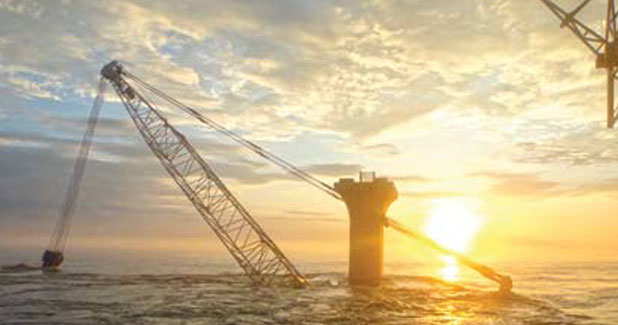

India recently inaugurated its longest river bridge: The 9,150-m Dhola Sadiya Bridge across river Lohit at the easternmost tip of Assam. Notably, the project, constructed as part of a PPP between MoRTH and Navayuga Engineering Company, is 3.55 km longer than the Bandra-Worli Sea Link in Mumbai. The total length of the project, including the approach roads on each side, is 28.50 km.
'The magnitude of this project was simply huge,' says Dr Ir Chandramohan PV, President-Technical, Navayuga Engineering Company. 'A total of 736 piles had to be installed. The batching plant and transit mixers had to keep pace with the piling. A number of hydraulic rotary piling rigs were mobilised. Cranes were required for lifting and placing reinforcement cages and liners. As there were 182 piers, shuttering for the pile cap was also massive. The pier had a special shape. Moulds for these were a colossal requirement. The casting yard was another massive entity. Further, practically everything had to be transported from faraway places. Despite all the floods witnessed, we were able to complete this massive project within five years. That was an achievement.'
The project will help reduce the travel time between Assam and Arunachal Pradesh from six hours to just one hour as, with the bridge, the distance will shrink by 165 km. What's more, the bridge project will enhance the entire transport system of North Assam as 375 km of the Brahmaputra river bank has no bridge for transportation. As Chandramohan rightly says, 'The opening of this bridge has thrown open immense possibilities. This will open a route from northern Assam to Arunachal Pradesh. This is an all-important connection that will propel intense development in the area.'
- SERAPHINA D'SOUZA
Modified Coal Linkage Policy: A positive move for the power sector
On May 17, the Cabinet Committee on Economic Affairs (CCEA) approved the Modified Coal Linkage Policy for the power sector. Under this policy, all power plants will be assured of adequate supply of coal at competitive prices. Over the past few years, the big challenge for Indian power companies has been to ensure adequate and timely supply of coal. Frequent delays and unviable economics forced power plants to operate at uneconomical plant load factors (PLF).
'The new Coal Linkage Policy will only cover regulated units,' says Mayuresh Joshi, Fund Manager, Angel Broking. 'Under the policy, the linkages will be first awarded to state-owned DISCOMS. In turn, these DISCOMS will assign these to state or central power producers on an allocation basis. For independent power producers (IPPs) with power purchase agreements (PPA), the allocation will be via the reverse auction route.'
Thermal power generation capacity (ie 221 GW) represents 67 per cent of India's total power generation capacity. Of this, coal-based capacity works out to 88 per cent, indicating a lion's share in overall capacity. 'So,' says Joshi, 'the new policy is likely to be positive for the sector. While its full contours are yet to be announced, if it can ensure the flow of dry fuel to power plants at competitive rates, it can be a game-changer for power companies.'
In fact, the proposal had been pending with the Cabinet for long. Now, Power Minister Piyush Goyal has promised speedy and effective implementation of the policy to help mitigate the problems of power utilities.
Why are construction companies objecting to bid terms for the Mumbai-Nagpur Expressway?
The Maharashtra Government's ambitious Rs 27,650-crore Mumbai-Nagpur Expressway project is facing objection from highway developers regarding the latest changes in bid conditions. Here's why! According to reports, the Maharashtra State Road Development Corporation (MSRDC) had invited bids for 16 packages of the expressway on January 1, 2017, with companies having been asked to submit bids by March 23. Notably, even though MSRDC received about 40 bids for the projec - including ones from China, Russia, Italy, Korea, Kuwait and Singapore - reports indicate that the bidding process was abruptly cancelled on the last day, a few hours before the deadline.
On March 29, MSRDC invited fresh bids incorporating some new conditions. A senior spokesperson of the National Highways Builders Federation (NHBF) speaking exclusively to CW explains the criteria that the bidders are against. 'First, companies have been disqualified if they are incurring losses,' he says. 'Second, companies have been disqualified if they have undertaken corporate debt restructuring (CDR) or strategic debt restructuring (SDR). And, companies need to have experience in building an'access-controlled highway'. There are many companies that are solvent, but some of their SPVs have suffered the CDR issue. Just because one of their SPVs have faced the CDR issue, it does not mean the whole company should be barred.' Thus, NHBF sees the new conditions as severe restrictive qualification requirements that will limit competition.
In its current form, the request for qualification (RFQ) allows a limited number of bidders to participate in the mega project, also eliminating a large number of bidders who had submitted their applications against the cancelled RFQ. Reportedly, according to NHBF, the requirement of experience of an access controlled highway is superfluous and may be dispensed with, under the assumption that highway contractors are competent enough to construct such highways. It is known that the federation has written a letter to MSRDC regarding this issue, and has also sent copies to the offices of the chief minister, public works minister and the prime minister.
- SERAPHINA D'SOUZA
To share your perspective on current industry happenings, write in at feedback@ConstructionWorld.in